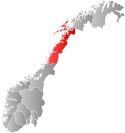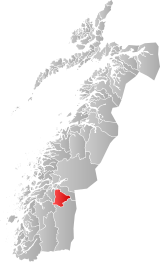Korgen is a former municipality in Nordland county, Norway. The 625.5-square-kilometre (241.5 sq mi) municipality existed from 1918 until its dissolution in 1964. The municipality included the central part of what is now Hemnes Municipality, centered around the river Røssåga. It was located in the traditional district of Helgeland. The administrative centre was the village of Korgen where Korgen Church is located.
Korgen Municipality
Korgen herred | |
|---|---|
 Nordland within Norway | |
 Korgen within Nordland | |
| Coordinates: 66°04′36″N 13°49′18″E / 66.0766°N 13.8216°E | |
| Country | Norway |
| County | Nordland |
| District | Helgeland |
| Established | 1 July 1918 |
| • Preceded by | Hemnes Municipality |
| Disestablished | 1 Jan 1964 |
| • Succeeded by | Hemnes Municipality |
| Administrative centre | Korgen |
| Government | |
| • Mayor (1955-1963) | Ole Brygfjeld (Ap) |
| Area (upon dissolution) | |
| • Total | 625.5 km2 (241.5 sq mi) |
| • Rank | #161 in Norway |
| Highest elevation | 1,915.75 m (6,285.27 ft) |
| Population (1963) | |
| • Total | 3,105 |
| • Rank | #294 in Norway |
| • Density | 5/km2 (10/sq mi) |
| • Change (10 years) | |
| Demonym | Korgen-folk[2] |
| Official language | |
| • Norwegian form | Bokmål[3] |
| Time zone | UTC+01:00 (CET) |
| • Summer (DST) | UTC+02:00 (CEST) |
| ISO 3166 code | NO-1830[5] |
Prior to its dissolution in 1964, the 625.5-square-kilometre (241.5 sq mi) municipality was the 161st largest by area out of the 689 municipalities in Norway. Korgen Municipality was the 294th most populous municipality in Norway with a population of about 3,105. The municipality's population density was 5 inhabitants per square kilometre (13/sq mi) and its population had increased by 9.7% over the previous 10-year period.[6][7]
General information
editThe municipality of Korgen was established on 1 July 1918 when it was separated from the large Hemnes Municipality. Initially, the municipality had 1,369 residents. During the 1960s, there were many municipal mergers across Norway due to the work of the Schei Committee. On 1 January 1964, Korgen Municipality (population: 3,033) was merged with Hemnes Municipality (population: 1,352), the southern district of Sør-Rana Municipality (population: 934), and the far northern part of Hattfjelldal Municipality (population: 168) to create a new, larger Hemnes Municipality.[8]
Name
editThe municipality (originally the parish) is named after the old Korgen farm since the first Korgen Church was built there. The name is probably derived from the word korga which means "extension". This is likely referring to the location of the farm, on a long, wide peninsula surrounded on three sides by the river Røssåga.[9]
Churches
editThe Church of Norway had one parish (sokn) within Korgen Municipality. At the time of the municipal dissolution, it was part of the Hemnes prestegjeld and the Indre Helgeland prosti (deanery) in the Diocese of Sør-Hålogaland.[7]
| Parish (sokn) | Church name | Location of the church | Year built |
|---|---|---|---|
| Korgen | Korgen Church | Korgen | 1863 |
Geography
editThe highest point in the municipality was the 1,915.75-metre (6,285.3 ft) tall mountain Oksskolten, on the border with Sør-Rana Municipality.[1]
Government
editWhile it existed, Korgen Municipality was responsible for primary education (through 10th grade), outpatient health services, senior citizen services, welfare and other social services, zoning, economic development, and municipal roads and utilities. The municipality was governed by a municipal council of directly elected representatives. The mayor was indirectly elected by a vote of the municipal council.[10] The municipality was under the jurisdiction of the Hålogaland Court of Appeal.
Mayors
editThe mayor (Norwegian: ordfører) of Korgen was the political leader of the municipality and the chairperson of the municipal council. Here is a list of people who held this position:
Municipal council
editThe municipal council (Herredsstyre) of Korgen was made up of 17 representatives that were elected to four year terms. The tables below show the historical composition of the council by political party.
| Party name (in Norwegian) | Number of representatives | |
|---|---|---|
| Labour Party (Arbeiderpartiet) | 9 | |
| Communist Party (Kommunistiske Parti) | 1 | |
| Christian Democratic Party (Kristelig Folkeparti) | 2 | |
| Centre Party (Senterpartiet) | 3 | |
| Liberal Party (Venstre) | 2 | |
| Total number of members: | 17 | |
| Note: On 1 January 1964, Korgen Municipality became part of Hemnes Municipality. | ||
| Party name (in Norwegian) | Number of representatives | |
|---|---|---|
| Labour Party (Arbeiderpartiet) | 10 | |
| Communist Party (Kommunistiske Parti) | 1 | |
| Joint List(s) of Non-Socialist Parties (Borgerlige Felleslister) | 6 | |
| Total number of members: | 17 | |
| Party name (in Norwegian) | Number of representatives | |
|---|---|---|
| Labour Party (Arbeiderpartiet) | 5 | |
| Communist Party (Kommunistiske Parti) | 1 | |
| Joint List(s) of Non-Socialist Parties (Borgerlige Felleslister) | 6 | |
| Total number of members: | 12 | |
| Party name (in Norwegian) | Number of representatives | |
|---|---|---|
| Labour Party (Arbeiderpartiet) | 1 | |
| List of workers, fishermen, and small farmholders (Arbeidere, fiskere, småbrukere liste) | 4 | |
| Joint List(s) of Non-Socialist Parties (Borgerlige Felleslister) | 7 | |
| Total number of members: | 12 | |
| Party name (in Norwegian) | Number of representatives | |
|---|---|---|
| List of workers, fishermen, and small farmholders (Arbeidere, fiskere, småbrukere liste) | 6 | |
| Joint List(s) of Non-Socialist Parties (Borgerlige Felleslister) | 5 | |
| Local List(s) (Lokale lister) | 1 | |
| Total number of members: | 12 | |
| Party name (in Norwegian) | Number of representatives | |
|---|---|---|
| Labour Party (Arbeiderpartiet) | 3 | |
| Farmers' Party (Bondepartiet) | 5 | |
| Liberal Party (Venstre) | 2 | |
| Joint List(s) of Non-Socialist Parties (Borgerlige Felleslister) | 2 | |
| Total number of members: | 12 | |
| Note: Due to the German occupation of Norway during World War II, no elections were held for new municipal councils until after the war ended in 1945. | ||
See also
editReferences
edit- ^ a b "Høgaste fjelltopp i kvar kommune" (in Norwegian). Kartverket. 2024-01-16.
- ^ "Navn på steder og personer: Innbyggjarnamn" (in Norwegian). Språkrådet.
- ^ "Norsk Lovtidende. 2den Afdeling. 1932. Samling af Love, Resolutioner m.m". Norsk Lovtidend (in Norwegian). Oslo, Norway: Grøndahl og Søns Boktrykkeri: 453–471. 1932.
- ^ "Forskrift om målvedtak i kommunar og fylkeskommunar" (in Norwegian). Lovdata.no.
- ^ Bolstad, Erik; Thorsnæs, Geir, eds. (2023-01-26). "Kommunenummer". Store norske leksikon (in Norwegian). Kunnskapsforlaget.
- ^ Statistisk sentralbyrå. "Table: 06913: Population 1 January and population changes during the calendar year (M)" (in Norwegian).
- ^ a b Statistisk sentralbyrå (1951-01-01). Norges Sivile, Geistlige, Rettslige og Militære Inndeling 1. Januar 1951 (PDF). Norges Offisielle Statistikk (in Norwegian). Oslo, Norge: H. Aschehoug & Co.
- ^ Jukvam, Dag (1999). Historisk oversikt over endringer i kommune- og fylkesinndelingen (PDF) (in Norwegian). Statistisk sentralbyrå. ISBN 9788253746845.
- ^ Rygh, Oluf (1905). Norske gaardnavne: Nordlands amt (in Norwegian) (16 ed.). Kristiania, Norge: W. C. Fabritius & sønners bogtrikkeri. p. 137.
- ^ Hansen, Tore; Vabo, Signy Irene, eds. (2022-09-20). "kommunestyre". Store norske leksikon (in Norwegian). Kunnskapsforlaget. Retrieved 2022-10-14.
- ^ "Gravfærd". Nordlands Avis (in Norwegian). 1918-05-23. p. 2. Retrieved 2024-10-18.
- ^ "Til ordfører". Helgelands Blad (in Norwegian). 1919-11-29. p. 2. Retrieved 2024-10-18.
- ^ "Formannskaps- og ordførervalg". Helgelands Blad (in Norwegian). 1925-12-16. p. 2. Retrieved 2024-10-18.
- ^ "Ordførervalg". Lofotposten (in Norwegian). 1932-01-04. p. 2. Retrieved 2024-10-18.
- ^ "De nye ordførere i Nordland fylke". Nordlandsposten (in Norwegian). 1935-02-18. p. 2. Retrieved 2024-08-06.
- ^ "De nye ordførere og varaordførere i Nordland opnevnt". Lofotposten (in Norwegian). 1941-01-16. pp. 1 & 6. Retrieved 2024-08-06.
- ^ "Nye ordførere og varaordførere i Nordland fylke". Nordlandsposten (in Norwegian). 1943-01-05. p. 4. Retrieved 2024-08-06.
- ^ "De nye, midlertidige ordførere i Nordland og Troms". Lofotposten (in Norwegian). 1945-05-14. p. 6. Retrieved 2024-08-06.
- ^ "Til ordfører i Korgen". Helgeland Arbeiderblad (in Norwegian). 1946-01-09. p. 3. Retrieved 2024-10-18.
- ^ "Ole Brygfjell". Nordlands Framtid (in Norwegian). 1955-12-20. p. 4. Retrieved 2024-10-18.
- ^ "Kommunevalgene og Ordførervalgene 1959" (PDF) (in Norwegian). Oslo: Statistisk sentralbyrå. 1960. Retrieved 2020-03-18.
- ^ "Kommunevalgene og Ordførervalgene 1955" (PDF) (in Norwegian). Oslo: Statistisk sentralbyrå. 1957. Retrieved 2020-03-18.
- ^ "Kommunevalgene og Ordførervalgene 1951" (PDF) (in Norwegian). Oslo: Statistisk sentralbyrå. 1952. Retrieved 2020-03-18.
- ^ "Kommunevalgene og Ordførervalgene 1947" (PDF) (in Norwegian). Oslo: Statistisk sentralbyrå. 1948. Retrieved 2020-03-18.
- ^ "Kommunevalgene og Ordførervalgene 1945" (PDF) (in Norwegian). Oslo: Statistisk sentralbyrå. 1947. Retrieved 2020-03-18.
- ^ "Kommunevalgene og Ordførervalgene 1937" (PDF) (in Norwegian). Oslo: Statistisk sentralbyrå. 1938. Retrieved 2020-03-18.